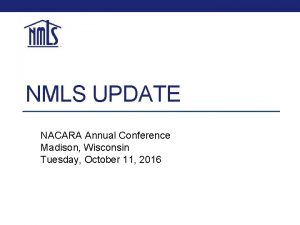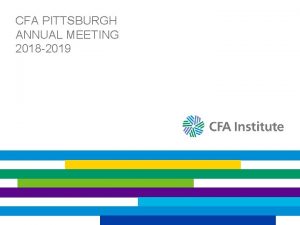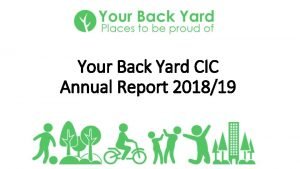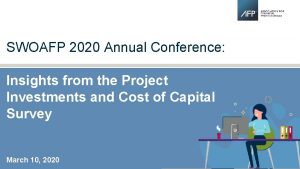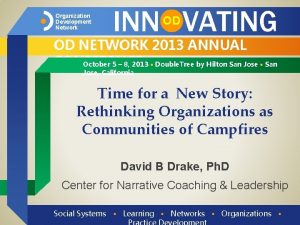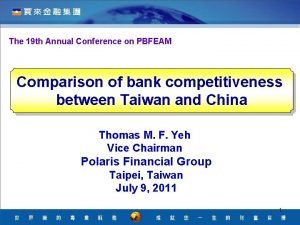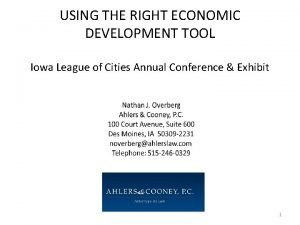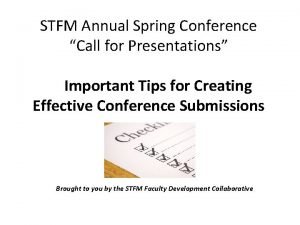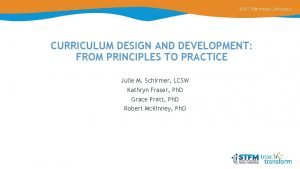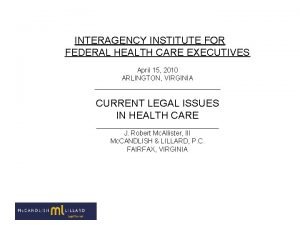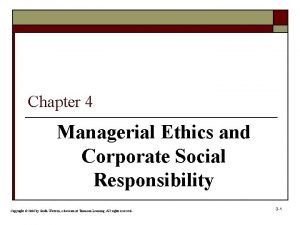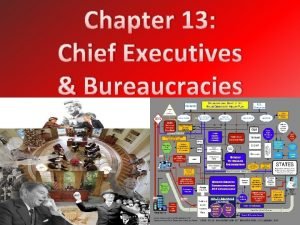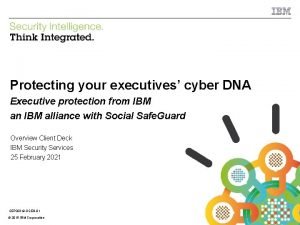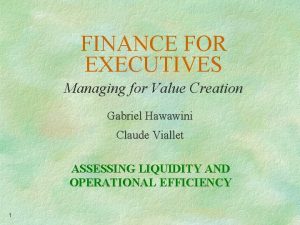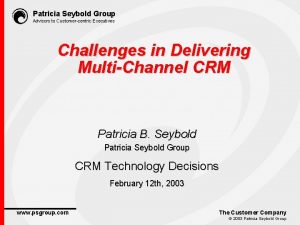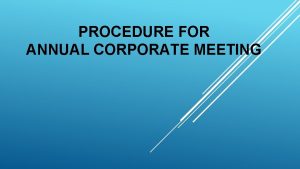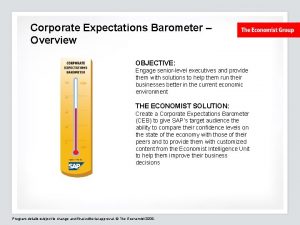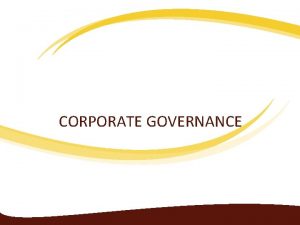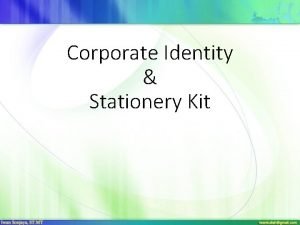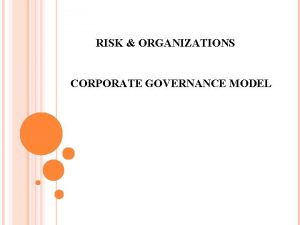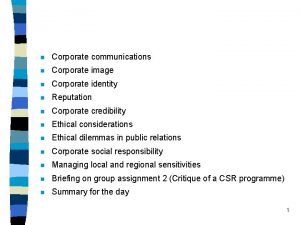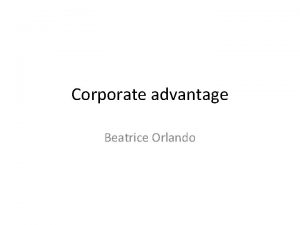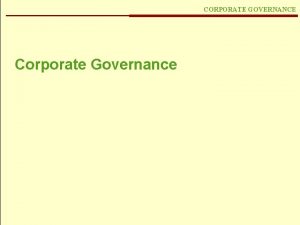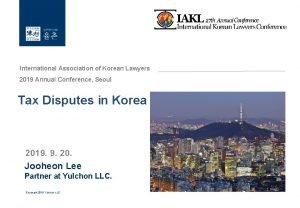Association of Corporate Advisors Executives Annual Conference 2019
























- Slides: 24

Association of Corporate Advisors & Executives Annual Conference – 2019 “Concept of Start ups – Tax Implications” Presentation by: Yogesh Thar Partner Bansi S. Mehta & Co. Chartered Accountants

Background • Startup India is a flagship initiative of the Government of India, intended to build a strong eco-system for nurturing innovation and Startups in the country that will drive sustainable economic growth and generate large scale employment opportunities. The Government through this initiative aims to empower Startups to grow through innovation and design. • In order to meet the objectives of the initiative, Government of India has announced Action Plan in 2016 that addresses all aspects of the Startup ecosystem. With this Action Plan the Government hopes to accelerate spreading of the Startup movement: • From digital/ technology sector to a wide array of sectors including agriculture, manufacturing, social sector, healthcare, education, etc. ; and • From existing tier 1 cities to tier 2 and tier 3 cities including semi-urban and rural areas. 14 December 2021 Bansi S. Mehta & Co. , Chartered Accountants, Mumbai 3

Action Plan – a bird’s eye view • • • Simplification and Handholding Compliance Regime based on Self-certification Startup India Hub Rolling out of Mobile App and Portal Legal Support and Fast-tracking Patent Examination at Lower Costs Relaxed Norms of Public Procurement for Startups Faster Exit for Startups Funding Support and Incentives Providing Funding Support through a Fund of Funds with a Corpus of INR 10, 000 crore Credit Guarantee Fund for Startups Tax Exemption on Capital Gains 14 December 2021 Bansi S. Mehta & Co. , Chartered Accountants, Mumbai 4

Action Plan – a bird’s eye view (cont’d) • • • Tax Exemption to Startups for 3 years Tax Exemption on Investments above Fair Market Value Industry-Academia Partnership and Incubation Organizing Startup Fests for Showcasing Innovation and Providing a Collaboration Platform Launch of Atal Innovation Mission (AIM) with Self-Employment and Talent Utilization (SETU) Program Harnessing Private Sector Expertise for Incubator Setup Building Innovation Centres at National Institutes Setting up of 7 New Research Parks Modeled on the Research Park Setup at IIT Madras Promoting Startups in the Biotechnology Sector Launching of Innovation Focused Programs for Students Annual Incubator Grand Challenge 14 December 2021 Bansi S. Mehta & Co. , Chartered Accountants, Mumbai 5

Definition of Start up (Action Plan) ACTION PLAN, 2016 • Startup means an entity, incorporated or registered in India not prior to 5 years, with annual turnover not exceeding INR 25 crore in any preceding financial year, working towards innovation, development, deployment or commercialization of new products, processes or services driven by technology or intellectual property. • Provided that such entity is not formed by splitting up, or reconstruction, of a business already in existence. • Provided also that an entity shall cease to be a Startup if its turnover for the previous financial years has exceeded INR 25 crore or it has completed 5 years from the date of incorporation/ registration. 14 December 2021 Bansi S. Mehta & Co. , Chartered Accountants, Mumbai 6

Definition of Start up (Action Plan) (cont’d) • Provided further that a Startup shall be eligible for tax benefits only after it has obtained certification from the Inter-Ministerial Board, setup for such purpose. • Entity eligible: • Pvt. Ltd. Company • Partnership firms • LLP AMENDMENT IN 2019: • Turnover limit: increased from INR 25 crores to INR 100 crores • Period of recognition as start up: Increased from 5 years to 7 years in 2018 and to 10 years from date of incorporation in 2019 14 December 2021 Bansi S. Mehta & Co. , Chartered Accountants, Mumbai 7

Definition of Start up (Income-tax Act) SEC. 80 IAC, 54 GB, 79, 56(2)(viib) – “Eligible start-up” • A company or a LLP (partnership firm not included); • Incorporated >= 1. 4. 2016, but < 1. 4. 2021 • Total turnover of its business <= INR 25 crores in the year in which deduction is claimed • Holds certificate from Inter-Ministerial Board 14 December 2021 Bansi S. Mehta & Co. , Chartered Accountants, Mumbai 8

Tax holiday – Section 80 IAC • Eligible start-up carrying on ”eligible business” • “eligible business”: • innovation, development or improvement of – • Products or processes or services or a scalable business model – • With a high potential of – • Employment generation; or • Wealth creation • 100% of the Profits and gains derived from eligible business • For 3 consecutive years out of 7 years from year of incorporation 14 December 2021 Bansi S. Mehta & Co. , Chartered Accountants, Mumbai 9

Tax holiday – Section 80 IAC (cont’d) • Conditions: • Not formed by splitting up or reconstruction • Not formed by transfer to a new business of previously used plant or machinery • 20% tolerance provided • Old machinery used outside India (by person other than assessee) and now imported in India and no depreciation ever claimed in India is exempted. • Stand alone fiction u/s. 80 IA(5) made applicable. Past losses to be set off first. Since this deduction is qua “eligible start-up” there is no possibility of such losses being set off against other businesses earlier. • Audit of accounts mandatory as in s. 80 IA(7); • To compute P&G, transfer pricing in 80 IA(8) made applicable – DTP provisions in s. 92 BA not amended. But s. 80 A(6) may apply. Hence DTP is applicable. 14 December 2021 Bansi S. Mehta & Co. , Chartered Accountants, Mumbai 10

Tax holiday – Section 80 IAC (cont’d) • Prohibition from double deduction u/c VIA – 80 IA(9) made applicable • Close connection transfer pricing in s. 80 IA(10) made applicable – DTP provisions in s. 92 BA not amended. But s. 80 A(6) may apply. Hence DTP is applicable. • S. 80 IA(12) and (12 A) not made applicable. Thus, exemption is not lost in cases of mergers or demergers. (Whether the assessee remains an “eligible start up” after merger, however, needs examination. Though deduction is “qua eligible business”, it is available to the “eligible start-up” only. 14 December 2021 Bansi S. Mehta & Co. , Chartered Accountants, Mumbai 11

Tax holiday – Section 80 IAC (cont’d) • Application to the IMB in Form-1: • • Name, address, Incorporation number, nature of business, proposed activities etc. Enclose Certificate of incorporation, MOA, LLP Deed Annual accounts Copies of IT returns • Application – online: Mobile app or portal set up by DPIIT • Write up as to how it is eligible: • innovation, development or improvement of – • Products or processes or services or a scalable business model – • With a high potential of – • Employment generation; or • Wealth creation 14 December 2021 Bansi S. Mehta & Co. , Chartered Accountants, Mumbai 12

Section 54 GB exemption • Individual or HUF earns LTCG from transfer of “residential property” (a house or a plot of land); • Net sale consideration is utilised for subscription in equity shares of eligible company before 139(1) due date; • The eligible company utilises this amount for purchase of new asset within 1 year from date of subscription; • Such LTCG is exempt in the ratio of cost of new asset to net consideration. • Amount not utilised by the company before 139(1) due date to be deposited in a capital gains scheme bank account 14 December 2021 Bansi S. Mehta & Co. , Chartered Accountants, Mumbai 13

Section 54 GB exemption (cont’d) • “Eligible Company” – • If Capital Gain has arisen on, say, October 10, 2019, then, the Company should have been incorporated during the period April 1, 2019 to 139(1) due date • Engaged in “eligible business” (as per s. 80 IAC) • Assessee owns >25% share capital / voting rights after the new subscription • It is an “eligible start-up” (as per s. 80 IAC) • “New Asset” – Means new plant and machinery, but does not include • • • old / used P/M, P/M installed in office, residence, guest house, Office appliances, Vehicles P/M whose 100% cost is allowed • New Asset will include computers and software for technology driven start-ups 14 December 2021 Bansi S. Mehta & Co. , Chartered Accountants, Mumbai 14

Section 54 GB exemption (cont’d) • Equity shares so subscribed should not be transferred for 5 years. • The company should not transfer the “new assets” for 5 years (if computers, 3 years) • Although DPIIT has increased turnover limit to INR 100 crores, the IT provisions continue with INR 25 lakh limit. 14 December 2021 Bansi S. Mehta & Co. , Chartered Accountants, Mumbai 15

Issues on Sec. 54 GB • A new technocrat may not normally own a house. The section may be of little use. • If a father gifts his house to the son and the son (technocrat) sells it and earns capital gains, will the exemption be available to him? • Ideally, issue of sweat equity should have been made exempt from tax; • Exemption available only for new subscription of shares and not to purchase of shares from any existing shareholders • “ 1 year before” type exemption (like in section 54) not available. • What if IMB approval comes after the subscription of shares? • Subscription in “equity shares” only qualifies. Not preference shares or CCDs or CCPs etc. • Investment in capital of a LLP which is a start up will NOT qualify for this exemption • What if 25% gets diluted by further issue of shares within 5 years? 14 December 2021 Bansi S. Mehta & Co. , Chartered Accountants, Mumbai 16

Exemption from S. 56(2)(viib) • Section 56(2)(viib) not to apply in cases covered by notification granting exemption – clause (ii) of the proviso Notification dt. 19. 02. 2019 issued by DPIIT: • a start-up shall be eligible for notification under clause (ii) of proviso to s. 56(2)(viib) if it fulfils following conditions: • It is recognised by DPIIT; • Aggregate of paid up share capital and share premium after issue <= Rs. 25 crores (not to count shares issued to NRs/VCC/VCF/Frequently traded company with NW > Rs. 100 crores or turnover > Rs. 250 crores (“specified company”)). • Share issue to “specified company” also exempt for recognised start-ups; 14 December 2021 Bansi S. Mehta & Co. , Chartered Accountants, Mumbai 17

Exemption from S. 56(2)(viib) (cont’d) • Further conditions to be satisfied: The start-up should NOT invest in: - • Residential house (except the one used for renting or held as S-I-T). Q: House for employees – not “for renting’. Whether permitted? • Other L&B (except the one used for its business or for renting or held as S-I-T) • Loans and advances (other than where lending money is substantial part of its business). Q: Loan or advance given to employees – whether permissible? Advances given to supplier – whether permissible? • Capital contribution to any other entity; • Shares and securities; • Car, aircraft, yatch etc. > Rs. 10 lakhs (except used for plying, hiring, leasing or as S-IT) • Jewellery (except S-I-T); • Artwork, etc (covered in clauses (iv) to (ix) of Expl. Clause (d) of S. 56(2)(vii) 14 December 2021 Bansi S. Mehta & Co. , Chartered Accountants, Mumbai 18

Exemption from S. 56(2)(viib) (cont’d) • Such investment not to be made for 7 years after issue of shares at premium • On issue of shares at premium, the start-up has to file Form-2 with DPIIT – DPIIT to forward it to CBDT • Form-2: Declaration • We have not invested in above; • We shall not invest in above for 7 years; • We understand that if we invest, our exemption will be retrospectively revoked. • Form-2 to be signed by person authorised to sign the ROI u/s. 140 14 December 2021 Bansi S. Mehta & Co. , Chartered Accountants, Mumbai 19

Exemption from S. 56(2)(viib) (cont’d) • Amendment to s. 56(2)(viib) by FA 2019: • Failure to comply with the conditions – excess premium that enjoyed exemption earlier, will be deemed to be income of the PY in which the failure takes place • Deemed under-reporting in consequence of mis-reporting of income u/s. 270 A of the Act. • Amendment prospective wef AY 2020 -21. Q. For past years can it be argued that the Notification went beyond the Statute and hence there could be no revocation? • CBDT issued Notification dated March 5, 2019 granting exemption to those recognised by DPIIT under above notification 14 December 2021 Bansi S. Mehta & Co. , Chartered Accountants, Mumbai 20

Exemption from S. 56(2)(viib) (cont’d) • CBDT Circular no. 16/2019 dated. 07. 08. 2019: • Start-up recognised by DPIIT – case selected for “limited scrutiny” on 56(2)(viib) ONLY: No verification should be done and contentions of assessee to be summarily accepted • Start-up recognised by DPIIT – case selected for “limited scrutiny” or “complete scrutiny” on various issues including 56(2)(viib): No verification should be done on 56(2)(viib). On other issues, verification only after obtaining approval of ‘supervisory officer’. • Start-up has not got DPIIT approval – case selected for “limited scrutiny” or “complete scrutiny” on various issues including 56(2)(viib): Verification only after obtaining approval of ‘supervisory officer’. 14 December 2021 Bansi S. Mehta & Co. , Chartered Accountants, Mumbai 21

Applicability of Section 79 • General rule for all closely held companies (including eligible start-ups): • Compare shareholding as on: • Last day of the PY in which loss is incurred; and • Last day of the PY in which set off is claimed • If < 51% voting power held with the same person(s) • Then, losses would lapse • Further relaxation for eligible start-ups (80 IAC definition) • Even if <51% voting power held by the same person(s); • If all the shareholders on last day of PY in which loss was incurred continue to hold those shares on last day of PY when set off is claimed • Losses won’t lapse. • Thus, if >51% voting power has changed due to new issue of shares, losses won’t lapse if all the original shareholders have not diluted their holdings. 14 December 2021 Bansi S. Mehta & Co. , Chartered Accountants, Mumbai 22

Exemption u/s. 54 EE Capital gain arising from transfer of any LTCA; Investment made in “long term specified asset” within 6 months; Then, LTCG is exempt to the extent of such investment. Investment made in one FY <= Rs. 50 lacs Total investment in the FY of LTCG + in the next FY < Rs. 50 lacs If “long term specified asset” transferred within 3 years or if loan taken against security of such “long term specified asset”, the exempt LTCG will be charged in such year. • “long term specified asset” means the units issued by notified funds. Intention seems to be to notify the fund of funds which would support new start-ups. • • • 14 December 2021 Bansi S. Mehta & Co. , Chartered Accountants, Mumbai 23

Wish list: Tax holiday should be extended even to MAT. Tax holiday should be extended even to partnership firms recognised as start-ups. Government should notify funds for S. 54 EE. 54 GB should be extended to all LTCG and not just on sale of residential house Conditions for 56(2)(viib) exemption are very stringent. Loans and advances given in the course of business should be permitted. • Exemption on capital gains on exit for the funder. • Concessional tax or exemption from tax on interest on loans given to start-ups – In line with S. 10(23 G) that was applicable for funding to infrastructure sector in early 2000 s. • Increase turnover limits in Income tax in line with the DPIIT revised limits of INR 100 crores • • • 14 December 2021 Bansi S. Mehta & Co. , Chartered Accountants, Mumbai 24

Thank you 14 December 2021 Bansi S. Mehta & Co. , Chartered Accountants, Mumbai 25
 Nmls conference
Nmls conference Travel health insurance association annual conference
Travel health insurance association annual conference Leoni corporate advisors
Leoni corporate advisors Cfa society pittsburgh
Cfa society pittsburgh Cic annual report 2019
Cic annual report 2019 Https //bit.ly2v
Https //bit.ly2v What is vating
What is vating Problemitize
Problemitize Hepi conference
Hepi conference Gie annual conference
Gie annual conference Fuze conference 2018
Fuze conference 2018 Pbfeam
Pbfeam Gcyf 2011 annual conference
Gcyf 2011 annual conference 2017 dvhimss annual fall conference
2017 dvhimss annual fall conference Iowa league of cities annual conference
Iowa league of cities annual conference Stfm conference
Stfm conference Stfm annual conference
Stfm annual conference Interagency institute for federal health care executives
Interagency institute for federal health care executives Ongc telephone directory 2016
Ongc telephone directory 2016 A group of executives appointed to oversee company ethics
A group of executives appointed to oversee company ethics Executive departments definition
Executive departments definition Fonctions exécutives
Fonctions exécutives Financial executives international canada
Financial executives international canada Protect your executives
Protect your executives Finance for executives: managing for value creation
Finance for executives: managing for value creation
